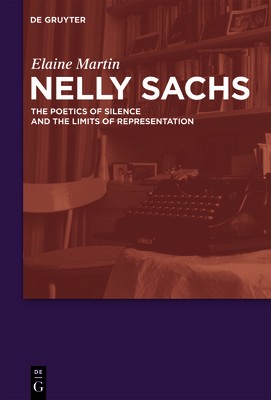
- We will send in 10–14 business days.
- Author: Elaine Martin
- Publisher: De Gruyter
- Year: 2011
- Pages: 207
- ISBN-10: 311025672X
- ISBN-13: 9783110256727
- Format: 15.6 x 23.4 x 1.3 cm, kieti viršeliai
- Language: English
- SAVE -10% with code: EXTRA
Reviews
Description
Nelly Sachs. The Poetics of Silence and the Limits of Representation examines the poetry of the Nobel Prize-winning German Jewish poet Nelly Sachs. It firstly shifts established patterns of reception by analysing the author's reception in East and West Germany after the war and the role she came to play in the Federal Republic as a representative 'Poet of Reconciliation'. The study then situates Sachs' work within the framework of the debate surrounding the representation of the Holocaust by means of a thorough exposition of the aporia at the heart of Theodor Adorno's writings on post-Holocaust art. It demonstrates by close reading how Sachs' work is itself marked by this aporetic struggle and exposes in particular the aesthetic means by which Sachs renders this aporetic tension legible in her poetry through her use of, for example, prosopopoeia, her recasting of traditional metaphors and her reversal of biblical archetypes. The primary question addressed is whether Sachs' poetry, in spite of the fact that it thematises the impossibility of adequate representation, has representational value, or whether her work is bereft of concrete, representational meaning as a result of the often fragmented nature of her writing. In particular, the author confronts those critics who see in Sachs' work elements of consolation, reconciliation, or redemption in a transcendental realm, in favour of a reading that regards her work as permeated with the concrete events of the Holocaust and irreconcilably opposed to any notion of a religious sense-making and redemptive paradigm.
EXTRA 10 % discount with code: EXTRA
The promotion ends in 21d.06:49:25
The discount code is valid when purchasing from 10 €. Discounts do not stack.
- Author: Elaine Martin
- Publisher: De Gruyter
- Year: 2011
- Pages: 207
- ISBN-10: 311025672X
- ISBN-13: 9783110256727
- Format: 15.6 x 23.4 x 1.3 cm, kieti viršeliai
- Language: English English
Nelly Sachs. The Poetics of Silence and the Limits of Representation examines the poetry of the Nobel Prize-winning German Jewish poet Nelly Sachs. It firstly shifts established patterns of reception by analysing the author's reception in East and West Germany after the war and the role she came to play in the Federal Republic as a representative 'Poet of Reconciliation'. The study then situates Sachs' work within the framework of the debate surrounding the representation of the Holocaust by means of a thorough exposition of the aporia at the heart of Theodor Adorno's writings on post-Holocaust art. It demonstrates by close reading how Sachs' work is itself marked by this aporetic struggle and exposes in particular the aesthetic means by which Sachs renders this aporetic tension legible in her poetry through her use of, for example, prosopopoeia, her recasting of traditional metaphors and her reversal of biblical archetypes. The primary question addressed is whether Sachs' poetry, in spite of the fact that it thematises the impossibility of adequate representation, has representational value, or whether her work is bereft of concrete, representational meaning as a result of the often fragmented nature of her writing. In particular, the author confronts those critics who see in Sachs' work elements of consolation, reconciliation, or redemption in a transcendental realm, in favour of a reading that regards her work as permeated with the concrete events of the Holocaust and irreconcilably opposed to any notion of a religious sense-making and redemptive paradigm.


Reviews